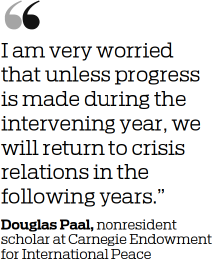US' increased defense bill draws rebuke
Budget expansion reflects intention to 'retain military hegemony', experts say


The US' military spending bill for 2022 is nothing short of a revelation of Washington's attempt to retain its military hegemony and fan the "flames of separatism", some observers have said, with some seeing it as long-running trends of military spending.
US President Joe Biden last week signed the National Defense Authorization Act into law, authorizing $768.2 billion in military spending for 2022, a 5 percent increase year-on-year despite its looming debt crisis and the ongoing pandemic.
The $768.2 billion price tag marks $25 billion more than Biden initially requested from Congress.
The expenditure has grown for the sixth consecutive year and by far the largest such annual expenditure of any country in the world, accounting for about 40 percent in global military spending.
Shen Dingli, a professor and former executive dean of the Institute of International Studies at Fudan University, said the US' intention of increasing military spending is to retain its military hegemony.
"The US has been a little anxious in recent years as emerging economies have popped up. This rising trend is seen as a threat by Washington," Shen said.
The document includes $7.1 billion for the so-called Pacific Deterrence Initiative and a statement of congressional support for the "defense" of Taiwan, as well as a ban on the US Defense Department procuring products produced from the Xinjiang Uygur autonomous region.
Senior Colonel Tan Kefei, spokesman for China's Ministry of National Defense, said on Dec 30 that the US defense bill has "seriously interfered with China's domestic affairs "and demonstrates Cold War mentality and ideological biases, with the intention of hyping up the so-called Chinese threat and smearing China's defense policy and military development.
Zhao Lijian, spokesman for the Foreign Ministry, urged the US to drop its zero-sum mentality and biases, and refrain from implementing any provision in the bill that harms China's interests, so as not to undermine the overall interests of Sino-US relations and bilateral cooperation in key areas.
Andrew Korybko, a Moscow-based US political analyst, said it is clear that the US "is fanning the flames of separatism". "Reviewing this list of anti-Chinese provocations, observers can confidently declare that the document is actually quite dangerous, provocative", Korybko said in a recent opinion piece published on CGTN.
"Therefore (the bill) doesn't have anything to do with 'defense' when it comes to the highlighted parts about China."
Sourabh Gupta, a senior fellow at the Institute for China-America Studies in Washington, said it does not signal an abrupt shift to prioritize China.
In an interview with China Daily, Gupta explained that former president Donald Trump had signed the Asia Reassurance Initiative Act in December 2018, which authorized $7.5 billion for five years to enhance US presence in the region.
Douglas Paal, a nonresident scholar at the Carnegie Endowment for International Peace, told China Daily that the budget reflects long-running trends and not a new prioritization of defense spending for China.
On the Xinjiang issue, Gupta said the charge of "genocide" was "a baldfaced lie" perpetrated by the West, especially in the run-up to the Beijing Winter Olympics. He said a similar tack was taken by the West in 2008, when it alleged there was an ongoing "cultural genocide" in the Tibet autonomous region before the Beijing Summer Olympics, which he said was shown to be "malicious fiction".
'Rivalrous attitude'
Liu Yuanling, a researcher in the Institute of American Studies at the Chinese Academy of Social Sciences, said the passage of the bill is not a surprise since Washington had thoroughly reviewed its policy toward China in recent years with a more aggressive and rivalrous attitude.
"We can clearly see the adversarial intentions in other fields such as diplomacy, trade and cultural exchanges," said Liu, adding that the military bill is in line with the US' anti-China strategy.
"Until the administration is able to muster the political resolve to concertedly engage Beijing and relay that clearly to the Chinese side, which I don't expect to be the case in 2022, relations will remain sour," Gupta said.
Paal said there needs to be progress made to avoid crisis. "I am very worried that unless progress is made during the intervening year, we will return to crisis relations in the following years," he said.
The bill also includes $300 million for the so-called Ukraine Security Assistance Initiative and $4 billion for the European Deterrence Initiative.
Wei Nanzhi, a researcher in the Institute of American Studies at the Chinese Academy of Social Sciences, said it is no longer possible for Washington to maintain hegemony by military deterrence as the world is heading toward decentralization and multipolarization.
Contact the writers at zhaoruinan@chinadaily.com.cn.


































